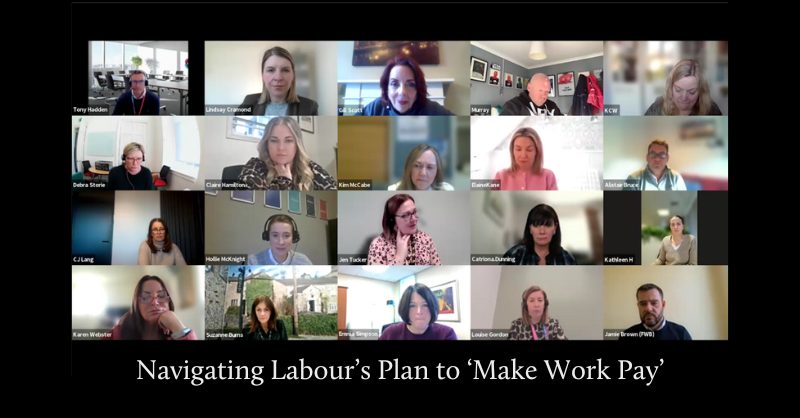Contact the team at FWB to discuss your individual or company requirements, or to discover more about our specialist services.
Specialist Internal Communications Forum – Covid-19 | Thursday 16th April
23 April 2020
- SHRLG
- Thought Leadership
In response to the Covid-19 Health and Developing Economic Crisis FWB Park Brown (FWB PB) is working closely with the Scottish HR Leadership Group to provide constructive support which also includes discussion forums and Q & As.
[divider line_type=”Full Width Line” line_thickness=”1″ divider_color=”extra-color-gradient-2″]
On Thursday 16th April, Alix Meekison facilitated a specialist Internal Communications forum. Bringing together a number of cross-sector HR and communications professionals, Lesley McPherson, Director of Communications at The Co-Operative Bank provided her expertise and guidance relating to engaging with employees through this challenging period. The forum encouraged an open and varied discussion and sharing of experiences across a range of industries including retail, software, transportation, banking, property, construction, oil & gas, healthcare and utilities.
The majority of participants indicated that there were a range of working arrangements being used within their businesses, with many having a mix of employees working from home as well as key workers who remain on site. It was unanimously agreed that communication during a crisis is vital to keep employees engaged however, the broader impacts Covid-19 is having on businesses economically has meant that it is proving challenging for some firms to find a balance in their communications to staff. Challenges participants faced included the frequency of communications and how much is too much, the content (e.g. Covid-19 issues versus business as usual) and ensuring consistency between internal and external messaging.
Employee Input
Many participants cited that listening to their employees and getting their input on what is needed and what they want to see, was core to their comms strategy and may help to alleviate some of the aforementioned concerns. One example of this included creating a colleague forum or virtual focus group, where a handful of employees across various disciplines are invited to share how they are feeling about the situation, their thoughts on how the business is handling it and what else could the organisation could be doing. It was agreed that honest and transparent communications were being highly valued by employees, as they look to seek clarity during uncertain times. Clear leadership and decision making was also a key discussion point and it was suggested that now is a good time for leadership to be visible. Involvement from the CEO and executive team in communications may be very powerful right now, particularly if this can be executed in a way which demonstrates authenticity.
Ensuring that the communications function has access to leadership is also important to ensure consistency in the messaging. Examples were shared where communications leaders were involved in daily calls with leaders from across the business to ensure the function has input to decision making and can manage the response accordingly.
Methods of Communication
As the landscape of the workplace has changed for so many, the usual methods of communication have also had to adapt to encourage a higher level of participation and engagement across all groups of employees. A mix of communication methods may be more effective during a time where there is a lot of ‘noise’ and communications coming from traditional methods such as email may get lost as a result. Alongside traditional mediums, some businesses indicated that they are using podcasts, pre-recorded videos or sound bites to enable workers to tune into internal comms in a different way. Having a core communications hub continued to be important however, and the majority of participants continued to utilise their company intranet as a key communication tool, with many creating separate ‘Covid-19’ portals to direct information and questions from employees into a particular space.
Global & Industry-Specific Challenges
A number of participants in the forum were operating within global organisations where Covid-19 is creating a communications challenge. Many countries are at different stages in the cycle and have had different responses to the crisis, and this is proving challenging to keep up with. In some instances, organisations continue to have employees working overseas and also in areas with very poor connectivity (e.g. vessels or oil & gas platforms). Empowering a localised approach to communications was key to the communication strategy for these businesses, with local management being much more heavily relied upon to disseminate information to their teams. Having a core, group wide message delivered by the CEO was also vital in these cases.
Within the oil & gas sector specifically, participants highlighted that there exists a broader challenge for their organisations due to the sharp oil price decline. Whilst giving a sense of stability and being transparent with employees is recognised as being important, there is a concern that there may limited upbeat news to share with employees during this time. Striking a balance between communications which may be perceived to be negative with positive news may be quite difficult. Many organisations agreed that it was good to be candid with employees however, there are ways to generate positivity amongst the workforce which can translate into your communications output. For example, ongoing CSR programmes or community involvement stories, such as posts of employees participating in ‘Clap for our Carers’ or colleague fundraising efforts, may be very uplifting during challenging times.
Key Principles
All participants were able to share innovative ideas and suggestions among the group with respect to improving and maintaining communication with staff during this period and beyond. The key principles that came out of the discussion included:
- Structure and prioritisation of communications. Keep including non-Covid-19 communications to encourage a sense of business continuity and keep employees engaged in both the day to day operations as well as the future.
- Concise messaging. Bitesize, easy to digest communications should be used to maximise effectiveness.
- Consistent messaging. Work closely with customer engagement teams to ensure that internal and external communications are consistent.
- Involve employees and get their input to continually develop and refine the communications strategy moving forward.
Throughout our HR forums over the last three weeks, communication has been a key topic. It is clear that many organisations are having more contact with their employees than ever before, which potentially strengthens and deepens employee engagement both now and in future.
For a downloadable copy of the above article please click here.
[divider line_type=”Full Width Line” line_thickness=”1″ divider_color=”default”]
The Scottish HR Leadership Group
Primarily the Scottish HR Leadership Group will focus on the advancement of the profession in Scotland plus have a development and mentoring framework. Our aim is to ensure an interesting, diverse and experienced group of senior practitioners across all sectors who can develop talent and as business leaders contribute and influence the broader societal agenda.
The purpose of this forum is to allow Senior HR Leaders to share their own experiences and gain further insight, thoughts and ideas and to allow more connectivity within the HR community given the evolving global Covid-19 pandemic.
Summaries of the discussions will be posted on our news section and also on LinkedIn.
For further information about any of these forums please contact us via:
Alix Meekison
Director, FWB Park Brown & Secretary, The Scottish HR Leadership Group
secretary@scottishhrlg.com
t. +44 (0)131 539 7087





